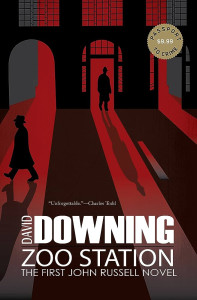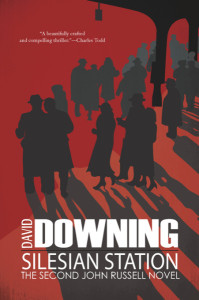 I ran across a reference to Zoo Station while browsing the web. I was looking up another book about Germany during World War II and the Amazon search engine gave me this title as a recommendation. It sounded interesting, and since I’d reviewed the first two books in James Benn’s Billy Boyle series from this press not long ago, we requested a review copy. When the package arrived from Soho, lo and behold it also included the next installment in what appears to be another excellent series in the making.
I ran across a reference to Zoo Station while browsing the web. I was looking up another book about Germany during World War II and the Amazon search engine gave me this title as a recommendation. It sounded interesting, and since I’d reviewed the first two books in James Benn’s Billy Boyle series from this press not long ago, we requested a review copy. When the package arrived from Soho, lo and behold it also included the next installment in what appears to be another excellent series in the making.
Zoo Station and Silesian Station are definitely in the espionage thriller genre. In that regard, I can easily compare them to Alan Furst’s Night Soldiers series. The principal differences are that author David Downing is British, not American; that these novels have a continuing plotline, which the Night Soldiers series does not; and that they display a rich vein of black humor that I have not found in Furst beyond the opening chapters of Night Soldiers.
These novels take place in Europe, primarily Berlin, in the late 1930s, when everyone knew there was going to be a war but it hadn’t quite started yet. The main character is a freelance reporter named John Russell. John is a veteran of the Great War and still suffers occasional flashbacks related to his combat experiences. Son of a British father and an American mother, he has lived in Berlin for fifteen years at the start of Zoo Station. He has an 11-year-old son named Paul who is a member of the Jungvolk, one of the youth groups started by the National Socialist Party to recruit members. Paul lives with his German mother Ilse and her second husband Matthias. John spends time with him when he can, often taking him to football (soccer) games with Paul’s uncle Thomas (still John’s close friend) and Thomas’s son Joachim. John also has a steady girlfriend, Effi, a stage and screen actress who gets fairly small parts but seems to have regular work.
As you can tell from this description, these novels are as much about John’s personal relationships as they are about his espionage activities. In fact, like many of the characters in Furst’s novels, John becomes a spy rather inadvertently and quite reluctantly. Initially, he’s approached by a Russian named Shchepkin, whom he knew when he and Ilse were active in the Communist Party back in the 1920s. Shchepkin offers him money in exchange for a series of articles on ordinary Germans for Pravda. John decides that a little extra money would be a good thing. The writing assignments don’t seem too different from his usual work, so he agrees.
Later it dawns on him that Shchepkin is an NKVD operative (that’s the Russian secret police). By then he is up to his ears in intrigue anyway. As he’s apparently done on other occasions as a way to supplement his income, John has taken on a small side job providing English lessons to two Jewish girls, teenaged daughters of a physician who can no longer practice because of the new anti-Semitic laws. After the father is arrested on a false charge and sent to Sachsenhausen, one of the prison camps already in full operation at this time, John starts cutting deals with the Russians and the English to get his wife and children safely out of the country, not an easy task by this time.
 Silesian Station picks up the action shortly after Zoo Station ends. John and Paul are on their way back to Berlin after spending a few weeks in the United States, where John has picked up a U.S. passport in exchange for agreeing to provide the Americans with intelligence. When they arrive, John learns that the Gestapo have arrested Effi on a flimsy (but not entirely false) charge. In order to gain her release, John agrees to serve as an agent for the Gestapo, leaking false information to the NKVD, which of course he doesn’t want to do. A somewhat unnecessary (and often invisible) subplot finds John helping Thomas find a Jewish girl who was abducted when she arrived in Berlin from Silesia. All of this insanity is taking place just weeks before Russia entered into a non-aggression pact with Germany, throwing the entire European intelligence community into complete disarray. Any further sequels to this storyline should get very, very intense!
Silesian Station picks up the action shortly after Zoo Station ends. John and Paul are on their way back to Berlin after spending a few weeks in the United States, where John has picked up a U.S. passport in exchange for agreeing to provide the Americans with intelligence. When they arrive, John learns that the Gestapo have arrested Effi on a flimsy (but not entirely false) charge. In order to gain her release, John agrees to serve as an agent for the Gestapo, leaking false information to the NKVD, which of course he doesn’t want to do. A somewhat unnecessary (and often invisible) subplot finds John helping Thomas find a Jewish girl who was abducted when she arrived in Berlin from Silesia. All of this insanity is taking place just weeks before Russia entered into a non-aggression pact with Germany, throwing the entire European intelligence community into complete disarray. Any further sequels to this storyline should get very, very intense!
The titles of both novels refer to U-Bahn (subway) stations that John and the other characters frequent as they travel around Berlin and into other parts of Europe. Like many of the spy thrillers I’ve read, these novels contain their share of scary train scenes, although with his newly-acquired affluence John also buys a car that he uses for some of his trips. Also like most of the spy thrillers I’ve read, a sense of place and distance is fundamental to a full appreciation of the action. For this reason, I would have liked to see maps in both books, at the very least one showing the main streets and buildings in Berlin, preferably also one showing the cities and towns that John visits as he goes about his work as a reporter-courier.
I mentioned at the start of this review that these novels feature quite a lot of black humor. This takes two forms. A lot of it is embedded in the narrative, which, although written in the third person, seems to be reflective of John’s own rather cynical perspective. So, for example, there’s a scene in Zoo Station where John and a cadre of other reporters are on hand for the opening of the new Reich Chancellery (an official government building intended to impress and intimidate those who visited it). When Hitler arrives, Downing treats us to the following observation:
He was drowned out by an eruption of applause. Right arms shot toward the ceiling, as if some celestial puppeteer had suddenly flicked a finger. His Nibs had arrived.
There are also some uproariously funny (albeit quite terrifying) scenes in which John, a totally unschooled spy, has to figure out what to do with notes he’s been handed by another operative. On one occasion, he carries a briefcase with a false bottom, but he forgets to latch the bottom before he leaves his hotel. On another, he decides to fold up the notes and put them inside his shoes, then practically wets himself standing in line at a border inspection when the guards have some of the other train passengers take off their shoes. He often uses restroom stalls as places to engage in packing and re-packing his bags, with quite hilarious results. I never expected to laugh while reading an espionage novel, but that’s one of the nice surprises about these!
I was unable to find more than a one or two sentence biography of David Downing on line, not enough to give me a sense of his personal background at all. I will say that he’s done a splendid job of providing both historical and cultural detail, down to the names of popular films, entertainers, department stores, food and sports teams. I look forward to seeing more novels about John Russell in the not-too-distant future!
(Soho Press, 2007)
(Soho Press, 2008)
